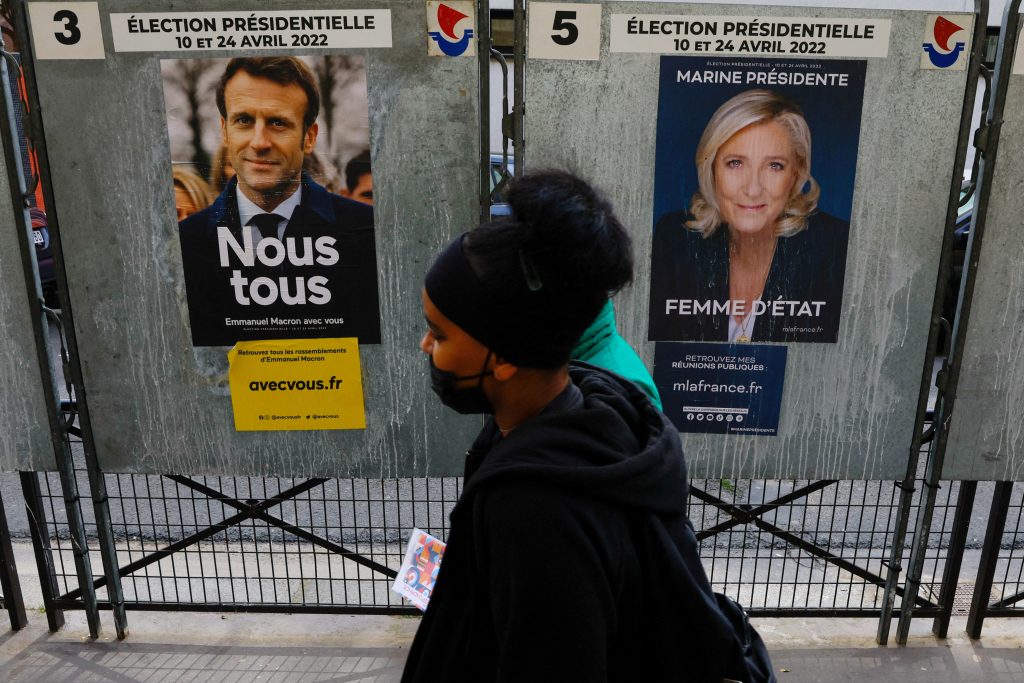Emmanuel Macron to face Marine Le Pen in French presidential election runoff

Centrist Macron and Le Pen, a long-time standard-bearer for the French far-right, were the top two candidates in the first round of Sunday’s vote, picking up 27.8% and 23.2% of the ballots respectively, according to the French Interior Ministry. Twelve candidates ran for the top job. Since none of them received more than 50% of the ballots in the first round, the top two candidates will face each other in a runoff on April 24.The first round of the 2022 contest was marked by voter apathy, with participation estimated at 73.3%, according to an analysis by pollster Ifop-Fiducial for French broadcasters TF1 and LCI — the lowest in a first round in 20 years. While Macron received more votes than any of the other candidates in the first round, he is a polarizing figure whose approval rating has sagged during his first term.In a speech after polls closed on Sunday, he urged citizens to vote in the second round.”Nothing is settled and the debate that we will have in the coming 15 days is decisive for our country and our Europe,” he said. “I don’t want a France which, having left Europe, would have as its only allies the international populists and xenophobes. That is not us. I want a France faithful to humanism, to the spirit of enlightenment,” he said.Macron is seeking to become the first French president to win reelection since Jacques Chirac in 2002. Polls have given him a consistent edge over the rest of the field, but the race has tightened significantly in the past month. Polling by Ifop-Fiducial released on Sunday showed that Macron would win a second-round contest against Le Pen by just 51% to 49%.Le Pen’s support has steadily risen in recent weeks. Though she is best known for her far-right policies such as drastically restricting immigration and banning Muslim headscarves in public places, she has run a more mainstream campaign this time around, softening her language and focusing more on pocketbook issues like the rising cost of living, a top concern for the French electorate. In her speech Sunday, Le Pen vowed to be a president for “all the French” if she wins the second round, and called on those who didn’t vote for Macron to support her in the second round. Macron has, so far, done very little campaigning. Experts believe his strategy was to avoid the political mudslinging as long as possible to brandish his image as the most presidential of all the candidates. Polling showed him consistently leading all candidates, and he was considered a shoo-in to make the second round. “The widespread dissatisfaction with Macron (especially among the young) means that the outcome is uncertain and unpredictable. Le Pen will continue to exploit this, and a major political upset therefore remains possible,” said CNN European affairs commentator Dominic Thomas of the second round matchup. “However much they may dislike Le Pen, there is a world of difference between her and Macron, and how she would disrupt European and global politics.” Le Pen has tried to portray herself as a very different candidate to the one who lost to Macron in 2017, when she attempted to position herself to the forgotten French working classes as her country’s answer to then-US President Donald Trump. While her economic nationalist stance, views on immigration, euroskepticism and positions on Islam in France are unchanged, Le Pen has sought to broaden her appeal.The contest was at first predicted to be a referendum on the dominance of the extreme right in French politics, but the war in Ukraine — another key issue for voters — upended the race. According to Ifop polling, Macron’s support peaked in early March, as potential voters rallied around the flag and rewarded the president for his attempts to mediate the conflict in Ukraine before Russia’s invasion, even if it was a failure.Many experts also expected the war to hurt the Le Pen, who had been a vocal admirer of Vladimir Putin, the Russian leader who has become a pariah in the West due to the Kremlin’s decision to invade Ukraine in late February. Le Pen visited the Russian president during her 2017 campaign; this time around, she was forced to scrap a leaflet with a photo of her and Putin from that trip after Russia’s unprovoked attack on its neighbor.Thomas, the CNN European affairs commentator, explained that the forthcoming debates will be crucial if Macron is to convince voters that Le Pen’s previous support for Putin should disqualify her.”He will be vulnerable on a range of domestic issues, but she will have difficulty convincing the electorate of her foreign policy credentials, especially given her longstanding links with Russia,” he said.CNN’s Xiaofei Xu and Camille Knight contributed to this report






